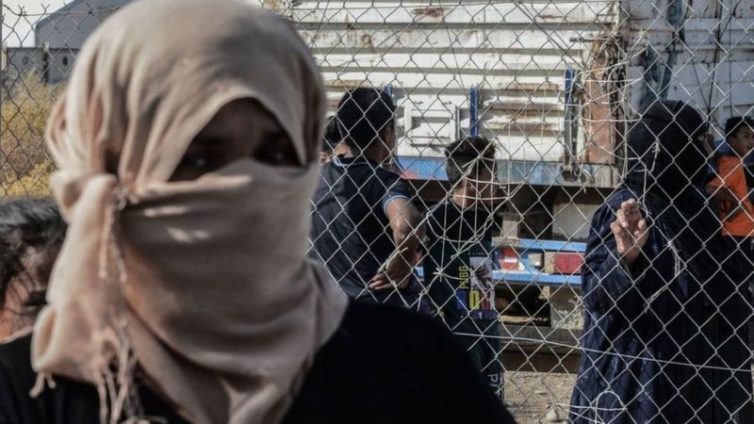
Audio By Carbonatix
The rapid closure of displacement camps in Iraq could leave more than 100,000 people without shelter in the middle of the coronavirus pandemic and as winter approaches, an aid group has warned.
People in camps in seven provinces were being forced out with little notice, the Norwegian Refugee Council said.
The government expects them to return to their areas of origin.
But many of those were destroyed during the war against the Islamic State (IS) group and still have not been rebuilt.
More than six million Iraqis fled their homes during the conflict, which officially ended in December 2017.
An estimated 1.3 million people remain displaced, while more than half of the 4.7 million returnees have gone back to areas where living conditions are "severe", according to the International Organization for Migration (IOM).
Iraq camp closures 'could leave 100,000 displaced people homeless' https://t.co/FNuAx9neO5
— APAC News (@NewsApac) November 9, 2020
Iraq's government began forcibly closing camps in August 2019.
Although departures slowed considerably this year, due in part to the Covid-19 pandemic, it remains committed to shutting down all the camps.
On Monday, the Norwegian Refugee Council (NRC) expressed extreme concern about the fate of thousands of families living in camps in Baghdad, Karbala, Diyala, Sulaymaniyah, Anbar, Kirkuk and Nineveh who were suddenly being made to leave.
Many came from neighbourhoods that were still totally destroyed and risked being blocked at checkpoints, or even arrested, because of lack of security clearance and perceived affiliation with armed groups such as IS, it said.
"Closing camps before residents are willing or able to return to their homes does little to end the displacement crisis. On the contrary, it keeps scores of displaced Iraqis trapped in this vicious cycle of displacement, leaving them more vulnerable than ever, especially in the middle of a raging pandemic," NRC Secretary General Jan Egeland warned.
So far, more than 600 households have left the NRC-managed Hammam al-Alil camp, which is one of the largest slated to close by next week.
Ahlam, a 49-year-old woman from the city of Mosul living at the camp, said: "This is my home. Why would you force me out of my home? We will become homeless. It feels like a funeral to me."
Almost half of the people forced to leave camps in Baghdad and Karbala in the past few weeks have not been able to return to their areas of origin, according to the IOM.
Many end up in precarious settings on the edge of cities and towns, in damaged, unsafe apartments or unfinished buildings, lacking basic necessities and healthcare.
The NRC called on the Iraqi government to inform families of camp closures at least a month in advance so that they could make necessary arrangements, and to ensure co-ordination with their areas of origin so they were not turned away at checkpoints.
"Anything short of such measures will expose tens of thousands of displaced Iraqis to continued deprivation, rejection and violence," Mr Egeland said.
Latest Stories
-
Adom FM’s ‘Strictly Highlife’ lights up La Palm with rhythm and nostalgia in unforgettable experience
2 hours -
Ghana is rising again – Mahama declares
5 hours -
Firefighters subdue blaze at Accra’s Tudu, officials warn of busy fire season ahead
6 hours -
Luv FM’s Family Party In The Park ends in grand style at Rattray park
6 hours -
Mahama targets digital schools, universal healthcare, and food self-sufficiency in 2026
6 hours -
Ghana’s global image boosted by our world-acclaimed reset agenda – Mahama
6 hours -
Full text: Mahama’s New Year message to the nation
6 hours -
The foundation is laid; now we accelerate and expand in 2026 – Mahama
7 hours -
There is no NPP, CPP nor NDC Ghana, only one Ghana – Mahama
7 hours -
Eduwatch praises education financing gains but warns delays, teacher gaps could derail reforms
7 hours -
Kusaal Wikimedians take local language online in 14-day digital campaign
8 hours -
Stop interfering in each other’s roles – Bole-Bamboi MP appeals to traditional rulers for peace
8 hours -
Playback: President Mahama addresses the nation in New Year message
9 hours -
Industrial and Commercial Workers’ Union call for strong work ethics, economic participation in 2026 new year message
10 hours -
Crossover Joy: Churches in Ghana welcome 2026 with fire and faith
11 hours

